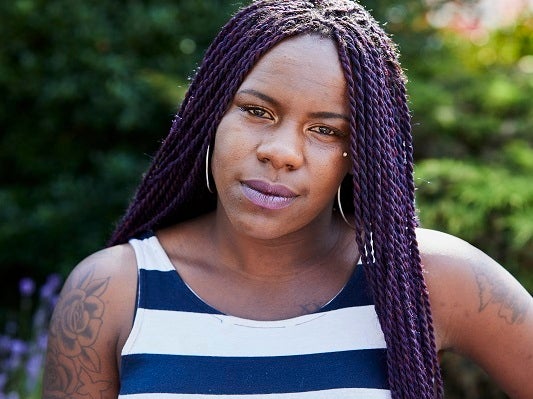NUS president attacks education system as ‘institutionally racist’ as she steps down
Exclusive: Universities must increase number of black academics and black texts, says Shakira Martin

Your support helps us to tell the story
From reproductive rights to climate change to Big Tech, The Independent is on the ground when the story is developing. Whether it's investigating the financials of Elon Musk's pro-Trump PAC or producing our latest documentary, 'The A Word', which shines a light on the American women fighting for reproductive rights, we know how important it is to parse out the facts from the messaging.
At such a critical moment in US history, we need reporters on the ground. Your donation allows us to keep sending journalists to speak to both sides of the story.
The Independent is trusted by Americans across the entire political spectrum. And unlike many other quality news outlets, we choose not to lock Americans out of our reporting and analysis with paywalls. We believe quality journalism should be available to everyone, paid for by those who can afford it.
Your support makes all the difference.The president of the National Union of Students has attacked the education system for being “institutionally racist” as she steps down from the role.
Universities must do more to ensure black women and working-class women reach positions of power and feel comfortable in them, Shakira Martin, the National Union of Students (NUS) president, said.
Speaking to The Independent, Ms Martin urged institutions to introduce more texts by black writers and to recruit more black lecturers as a way increasing diversity.
She argues racism on campus has also become more “overt” following the Brexit vote and said more universities needed to take a zero-tolerance approach.
The 31-year-old, who did not attend university, said: “We need to recognise that our education system is institutionally racist by default. It wasn’t built for working-class or black people.
“It was built for these stale, white, pale men to go in and to get these top jobs and to go into politics and to become business leaders.”
Ms Martin, who grew up in southeast London, says she has herself been a victim of classism and “anti-blackness” since becoming the president of the NUS.
Ms Martin, whose tenure is due to end this Sunday, said the bullying allegations she faced, which she strongly denies, stemmed from the way she speaks.
She said she was falsely accused of doing “gun fingers” at someone – a gesture, she claims, her accusers deliberately picked because she is strong, black woman from London.
Earlier this year, Ms Martin has told her critics to “f*** off” in a Facebook post after facing motions of no confidence from some student unions to remove her from the role.
Campaigners had been pushing for a motion of no confidence in Ms Martin over cost-cutting measures proposed by the NUS to plug the projected £3m deficit facing the union.
“It has been really difficult being NUS president. I came into this environment with a working-class mindset not understanding how to follow policies and procedures,” Ms Martin admitted.
She added that black students were likely to be deterred from applying to more prestigious universities in the wake of a media backlash against student-led proposals to “decolonise” the curriculum.
In 2017, Lola Olufemi, the former women’s officer at the University of Cambridge Students’ Union faced attacks for criticising the lack of black and ethnic minority writers on the English syllabus.
“It is evident from the backlash that getting in isn’t the same as getting on. It is one of the reasons why black students do not feel comfortable going to these institutions,” Ms Martin said.
Her comments come after a Sutton Trust report this week revealed that the country’s top professions are still dominated by those educated in private schools and at Oxbridge.
The figures also showed a rise in the proportion of privately educated cabinet ministers.
Ms Martin, a single mother of two, said more people from diverse walks of life were needed in positions of power to break the cycle of privilege.
She added: “We have a government that do not understand further education. That is evident from the fact it has often been forgotten.
“We have a bunch of politicians who have gone to Oxbridge who are making policies [affecting] working-class people without knowing what it is really like.”
She added: “I am just a normal girl. People like me don’t get positions like this. I wanted to inspire other young, working-class, black women and my community to break the cycle of deprivation.
“No matter where you come from you can still make something of yourself. I hope people have been able to see that during my presidency.”
Zamzam Ibrahim will take over as NUS president from July when she will become the union’s third female Black, Asian and minority ethnic (Bame) president in a row.
A spokesperson for Universities UK said: “We recognise there is more to do to enhance ethnic diversity within the university academic community.
“In conversations we had with students and staff as part of our work to close the Bame attainment gap, key issues including the lack of Bame role models at universities emerged.
“This included the importance of leadership from the top as well as universities sharing information on what works and what doesn’t to make real progress in reducing ethnic disparities.
“One hundred vice-chancellors have pledged to use recommendations from this work to change the culture in their own institutions.
“We also supports the Race Equality Charter which aims to improve the representation, progression and success of minority ethnic staff and students in higher education.
“This is a huge agenda and one which universities must prioritise to deliver on our commitments to equality and social justice.”
Join our commenting forum
Join thought-provoking conversations, follow other Independent readers and see their replies
Comments